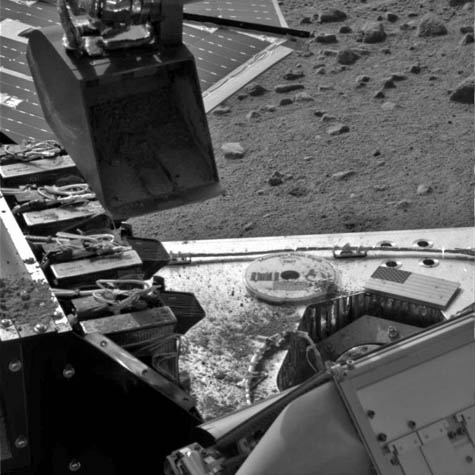Martian Garden
 [Image: Courtesy of NASA/JPL-Caltech/University of Arizona].
[Image: Courtesy of NASA/JPL-Caltech/University of Arizona].The soil chemistry on Mars is apparently just right for growing turnips. After digging up soil in a region of the Red Planet nicknamed Wonderland, the Phoenix rover "found trace levels of nutrients like magnesium, sodium, potassium and chloride," which is "the same basic chemistry as garden soil." These soil samples are also "fairly alkaline," we read, "with a pH of 8 or 9. This level of alkalinity is common for many Earth soils, and myriad bacteria and plants, including vegetables like asparagus and turnips, can thrive at such a pH."
So could we develop Mars gardens in our landscape architecture classes – pre-emptive landscape grafts that we'll export off-world for future planting?





Comments are moderated.
If it's not spam, it will appear here shortly!
More likely that Mars will be used for GMO production, once a turnip that thrives in a very cold, oxygen-free environment is produced. At that point, gigantic fields will terraform the planet, processing machinery will follow, and Earth's food shortages will be resolved through nightly space-pod showers .
The nano-martians have been awaiting this opportunity to ride our vegetables back to Earth so they can take over by inserting themselves into our DNA.
No, wait, that already happened, eons ago. We have been programmed to forget. Now we are on track to re-populate the home planet one curcurbit at a time.
Call any vegetable
And the chances are good
It will respond to you
Amazing to finally discover that there is Life, outside us self-centered earthling people.
And the discovery of a planet which has the possibility of Life, should be an asset to humanity, in terms of discovering its mysteries. Rather than planning our agenda's....
Invasive species?
Martian soil, sand, whatever you choose to call it, can support life. The question is what are we going to do about it?
The formation of humus (the organic matter in soil) is not difficult to achieve. Plants do it all the time. Breaking down rocks, and mixing their organic matter into the sand and clay. Plants are better equipped to explore Mars than robots or manned missions. We are infesting Mars with robots so why stop there?
The first astronauts should be PLANTS, FUNGUS and LICHENS. Plants are better suited (excuse the pun) than humans to carry out experiments and work on Mars:
1-Plants are smarter (they can heal, seek sunlight and look for water)
2-Plants are cheap and they cost next to nothing to make (all the R&D is done and testing complete)
3-They reproduce.
4-They can survive conditions harsher than anything you can imagine subjectively.
5-The cargo space required is no bigger than a seed.
6-Once deployed, they can grow and tell us more about real conditions in an integrated manner better than a bunch of expensive robot/sensors.
7-And answer a very scientific and fundamental question: Can life survive on Mars.
How much would NASA have to spend to develop any thing close?
Some say manned missions to Mars would be nice and a one way ticket to Mars would have no lack of volunteers. But has anyone here seriously thought of all the risks?: Risk is one thing a suicide mission is just plain stupid! The cosmic radiation alone would finish off our intrepid adventurers.
Plants are a tough bunch and if we loose a few who cares? No one seems to mind that millions of hectares of forests are cut and burned on Earth every day. So I'm sure no one would mind if a few hardy plants died trying to settle on Mars.
I've thought about the low Martian air pressure and lack on important co2 atmospheric concentrations to fully support vegetation:
With Earth at sea level having an amospheric pressure of 1
Mt Everest has .35
Mars .008!
(source:http://www.geocities.com/alt_cosmos/pressure.html)
One solution is self deployable greenhouses covering acres near the poles. CO2 released from the dry ice would fill the dome and spores/seedlings would be sheltered from sand storms
The domes would be an inflatable enclosure with self digging perimeter 'foundation' Think of an acre wide parachute floating down without strings but with a weighed edge with self driven anchor bolts and an activated foam edge seal on landing. Dome would fill from onboard air bottles while solar trapped heat and solar heat panels would free dry ice and water vapor from the ground. Seeds and spores would take root and
The rest as they say is history: the world's first martian bubble.
Dalani, I assume you've read Kim Stanley Robinson's Mars Trilogy; either way, you might like BLDGBLOG's earlier interview with Robinson about Mars, Antarctica, survival in extreme landscapes, etc. etc.
Geoff,
I've heard of KSR but never read his Martian trilogy. If, as the titles imply, these deal with terraforming mars, there is scientific evidence that planet is too small to hold an atmosphere which is too bad. Nevertheless, extreme environments are an interesting criteria for construction. Positive pressure inflatable structures may hold the key to successfully colonizing Mars.-in theory anyways
The Mars Trilogy is about terraforming, but it's quite interesting. A good summer read, if you're in the market for some sci-fi. Thanks for the comments!
The Martian Government is not to be trusted ! E.coli and salmonella
are biological agents developed on mars in a lab. they are here to cull the population so that only the most hardy and strongest Humans survive,this will help to
create a good gene pool for strong disease resistant HUMAN livestock !
that is why they are constantly abducting ,testing and experimenting, they dont want to take us if we arn't RIPE !
Post a Comment